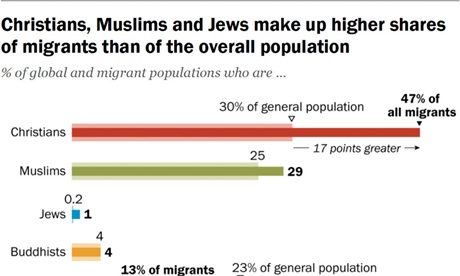A Pew Research Centre study released on Monday has found Christian migrants make up about 47 percent of the world’s 280 million migrants today – despite Christians accounting for only about 30 percent of the global population.
The study reported that Muslims and Jews are migrating in big numbers.
“Pew’s latest data – collected in 2020 – also found Muslims account for 29 percent of migrants, although they make up only 25 percent of the world’s population” said Stephanie Kramer, Pew’s lead researcher.
Jews account for only 0.2 percent of the world’s population but for one percent of migrants.
Pew research says Jews are “by far the most likely religious group to have migrated”.
A fifth of Jews worldwide live outside their country of birth compared to six percent of Christians, five percent Hindu, four percent Muslims and four percent Buddhist.
Major migration changes
The past three decades have seen migration outpace the global population growth by 83 percent, Pew Research says.
Many reasons are given for migration, though in its latest report Pew found that US migrants are much more likely to have a religious identity than the American-born population in general.
Migrant religious affiliation could significantly impact the religious composition of their destination countries. In the US “immigrants are kind of putting the brakes on secularisation” Pew says.
Selective migration
Pew’s study found that migrants often choose to move to countries where their religious identity is already represented and prevalent.
For example, Christians and religiously unaffiliated migrants share the US, Germany and Russia as their top three destinations.
The high rates of Jewish migration can be attributed in part to Israel’s Law of Return which grants Jews the right to receive automatic citizenship and make “aliyah”, a move to Israel, Kramer explains.
Kramer says overall immigration levels across religious groups have remained fairly stable over time.
Many of the findings in the new report are similar to the 2012 study which Kramer says is relatively unsurprising.
“Even in that older data you can see that religious minorities were so much more likely to leave their country of origin and migrate to a country where their religious identity was more prevalent” she says.
Source
Additional readingNews category: World.




